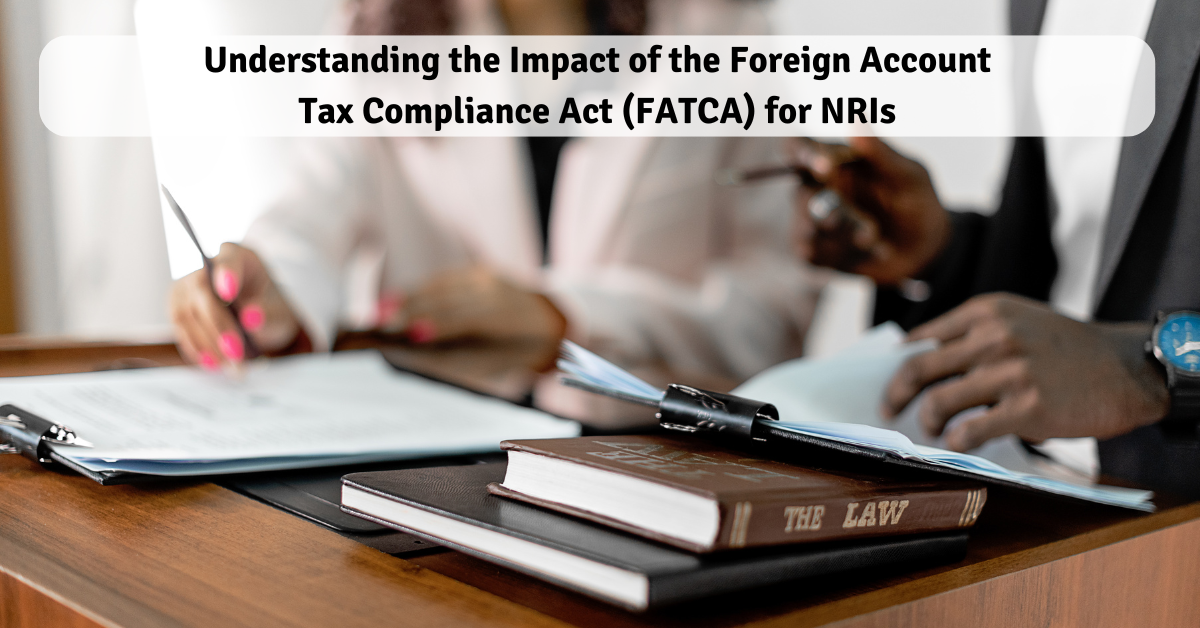Understanding the Impact of the Foreign Account Tax Compliance Act (FATCA) for NRIs

Are you an NRI (Non-Resident Indian)? If yes, then you might have heard about FATCA. But what is it exactly, and how does it affect you? Let’s break it down in simple terms.
What is FATCA?
FATCA or Foreign Account Tax Compliance Act was introduced by the US Tax Department (IRS) in 2010 to ensure tax compliance and prevent tax evasion. If a US citizen or tax resident tries to attempt offshore tax avoidance, this Act will be able to identify and prevent this action. It monitors the income earned from international investments and assets and obtains information regarding US owners of non-US entities.
FATCA authorises financial institutions to suppress tax if the documentation requirements are not fulfilled by the US NRI investor. All financial institutions that have been registered under this act are required to immediately inform the tax department of the US in case a US person indulges in tax evasion. Individual and non-individual investors must provide FATCA self-declaration.
India-US pact to ensure FATCA compliance
To comply with FATCA, the Indian government inserted Rules 114F to 114H and Form 61B in the Income Tax Act in 2014. From January 2016 onwards, it was made mandatory for all Indian and NRI investors (existing and new) to self-declare FATCA compliance.
Broadly the following details are sought:
- Name
- Permanent Account Number (PAN)
- Address
- Place (city/state) of birth
- Country of birth
- Nationality
- Gross Annual Income
- Occupation
- Whether one is a resident of another country? If yes, the details of the country of residence, Tax ID number, and type
The declaration specifically requires the inclusion of the US as a resident country if one is a US citizen or a green card holder. This is valid even if one has moved to India and is presently an Indian resident. As a result of this disclosure, the tax authorities would have access to all the required information. Further, in case of any change in the above information, it is mandatory to inform the concerned financial institution within 30 days of the change.
To whom does FATCA apply?
According to FATCA, everyone living in the USA is subject to this tax law. These include:
- US permanent residents or green card holders
- US citizens or NRIs who have migrated to the US and are now its naturalised citizens
- NRIs and Persons of Indian Origin (PIO) working in the US via B1/B2, H1-B, E-2, or L1/L2 visa
What Does It Mean for NRIs?
If you’re an NRI, here’s what you need to know about FATCA:
- Reporting Requirements: If you have financial assets in the U.S. or with U.S. connections, your bank might ask you for more information to report to the IRS. This could include your tax identification number (TIN).
- Impact on Financial Services: Some banks may find these rules hard to follow and might stop offering services to people affected by FATCA. This means it could be harder for you to open a bank account or get financial services in the U.S.
- Penalties for Non-Compliance: If you don’t comply with FATCA, there could be penalties. For example, the IRS might take a portion of your U.S. financial assets.
- Dual Taxation: Even though FATCA is about reporting, it could also affect your taxes. India and the U.S. have an agreement to avoid double taxation, but you need to be careful about your tax planning.
What Should NRIs Do?
- Know Your Status: Understand whether FATCA affects you. If you have financial dealings in the U.S., it probably does.
- Report Honestly: If you need to report under FATCA, make sure you do it fully and accurately. It’s better to be upfront than to face penalties later.
- Seek Professional Advice: Tax laws can be complex. If you’re unsure about your situation, talk to a financial advisor or tax professional who understands FATCA.
Non-compliance repercussions
Non-compliance with FATCA norms in India can lead to the freezing of bank accounts, suspension of mutual fund investments, and blocking of PPF or NPS accounts.
Conclusion
FATCA might seem complicated, but it’s mainly about ensuring that people pay their fair share of taxes on money they have in the U.S. As an NRI, staying informed and compliant with these rules can help you avoid trouble and manage your finances better.
Remember, managing your money wisely is key to financial success, and understanding laws like FATCA is part of that journey. So, take the time to understand these rules, and don’t hesitate to ask for professional financial planner help when needed.



